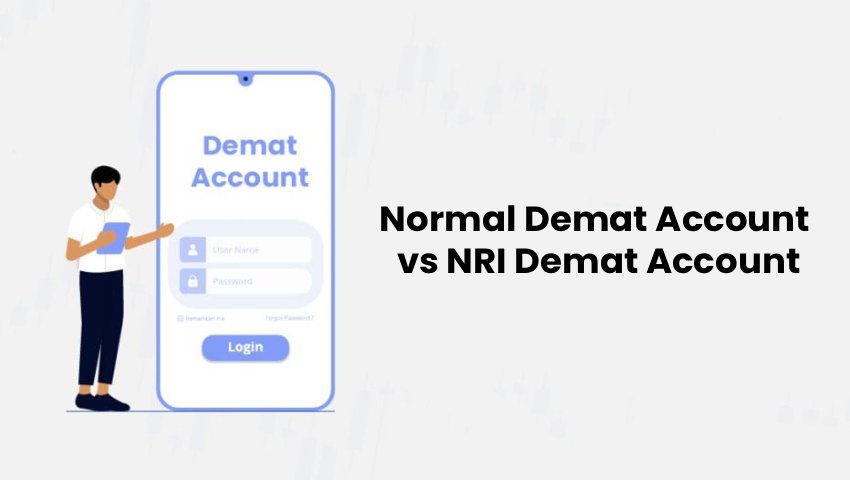
- 24/09/2025
- MyFinanceGyan
- 896 Views
- 4 Likes
- Share Market
Normal Demat Account vs NRI Demat Account in India: A Complete Guide
In India’s financial system, a Demat account is indispensable for anyone investing in shares, mutual funds, bonds, or other securities. While resident Indians open a standard Demat account, Non-Resident Indians (NRIs) must operate through a specially regulated account known as the NRI Demat account. Both serve the same purpose—holding securities in electronic form—but differ significantly due to regulatory, tax, and foreign exchange compliance. In this guide, we’ll explore the key differences between Normal and NRI Demat accounts, covering:
- Who can open them
- Legal and regulatory frameworks
- Linked bank accounts & repatriability
- Investment rules & restrictions
- Tax treatment
- Documentation and KYC requirements
- Conversion process when residency changes
- Practical examples and best practices
By the end, you’ll know which type of Demat account best suits your residency status and investment goals.
What Is a Normal Demat Account?
A Normal Demat Account is designed for resident Indians. It allows investors to convert physical securities into digital form and trade seamlessly in the Indian stock market.
Key features:
- Regulated by SEBI (Securities and Exchange Board of India)
- Linked to a resident savings bank account
- Used for stocks, mutual funds, bonds, ETFs, and government securities
- No foreign exchange rules apply
- Ideal for Indian residents participating in capital markets
What Is an NRI Demat Account?
An NRI Demat Account is tailored for Indians living abroad for employment, business, or other purposes.
Key features:
- Governed by FEMA (Foreign Exchange Management Act), RBI, and SEBI
- Must be linked to either an NRE (Non-Resident External) or NRO (Non-Resident Ordinary) bank account
- Enables NRIs to invest in Indian equity, debt, mutual funds, and IPOs
- Two variants:
- Repatriable (NRE-linked): Investment proceeds can be freely transferred abroad
- Non-repatriable (NRO-linked): Limited repatriation allowed, funds remain largely in India
Key Differences Between Normal and NRI Demat Accounts:
Regulatory Framework for NRI Demat Accounts:
- FEMA Compliance: Ensures proper management of cross-border capital flows
- RBI Portfolio Investment Scheme (PIS): Permission required for equity and derivative trading
- SEBI Guidelines: Strict KYC, due diligence, and compliance checks
This layered regulation makes NRI accounts distinct from resident accounts.
Types of NRI Demat Accounts:
NRE (Non-Resident External) Demat Account:
- Linked to an NRE savings account funded with foreign currency
- Fully repatriable – both principal and returns
- Best for NRIs who wish to transfer funds abroad freely
NRO (Non-Resident Ordinary) Demat Account:
- Linked to an NRO savings account holding income earned in India (rent, dividends, etc.)
- Funds are not fully repatriable; RBI approval needed beyond limits
- Best suited for managing income sources within India
Why NRIs Cannot Use a Normal Demat Account:
Resident Demat accounts are not compliant with FEMA and RBI regulations. If a person becomes an NRI, they must:
- Inform their broker and Depository Participant (DP)
- Close or convert their existing resident Demat account to an NRO/NRE-linked account
Failure to do so may invite penalties.
Conversion of Normal to NRI Demat Account:
When residency status changes, the investor must:
- Provide proof of NRI status (passport, visa, etc.)
- Complete KYC for NRI classification
- Link the account to an NRE or NRO bank account
- Notify their broker and DP
This ensures compliance with FEMA and RBI rules.
Taxation Differences:
NRIs should consult tax experts to optimize compliance across countries.
Documentation Checklist:
Advantages:
Normal Demat Account:
- Simple to open and operate
- Linked to domestic bank accounts
- Full trading freedom (equity, intraday, derivatives)
NRI Demat Account:
- Legal and compliant investment route for NRIs
- Option for fund repatriation (via NRE)
- Access to Indian equity and debt markets
- Protects investors from FEMA violations
Common Myths:
- Myth: NRIs can use their old Indian Demat account abroad
- Fact: Must be converted to NRI Demat account
- Myth: NRI accounts are too restrictive
- Fact: With proper permissions, NRIs enjoy wide investment access
- Myth: Only NRO accounts are allowed
- Fact: Both NRE and NRO-linked accounts exist, with different repatriation rules
Best Practices for Investors:
- Keep track of FEMA, RBI, and SEBI guidelines
- Choose account type based on repatriation needs
- Maintain proper records of conversions and KYC updates
- Use reputed brokers offering NRI-friendly services
- Consult tax professionals for cross-border compliance
Conclusion:
A Normal Demat Account is perfect for resident Indians, while an NRI Demat Account ensures compliance for Indians abroad. The two accounts may appear similar but differ widely in regulation, fund repatriation, taxation, and investment rights. NRIs must always operate through designated NRI accounts to avoid legal complications and enjoy seamless investing. The right choice depends on your residency status, financial objectives, & whether you want funds to be repatriable or retained in India.
Disclaimer: The views expressed in this article are for educational and awareness purposes only. This does not constitute financial advice or product recommendations.



